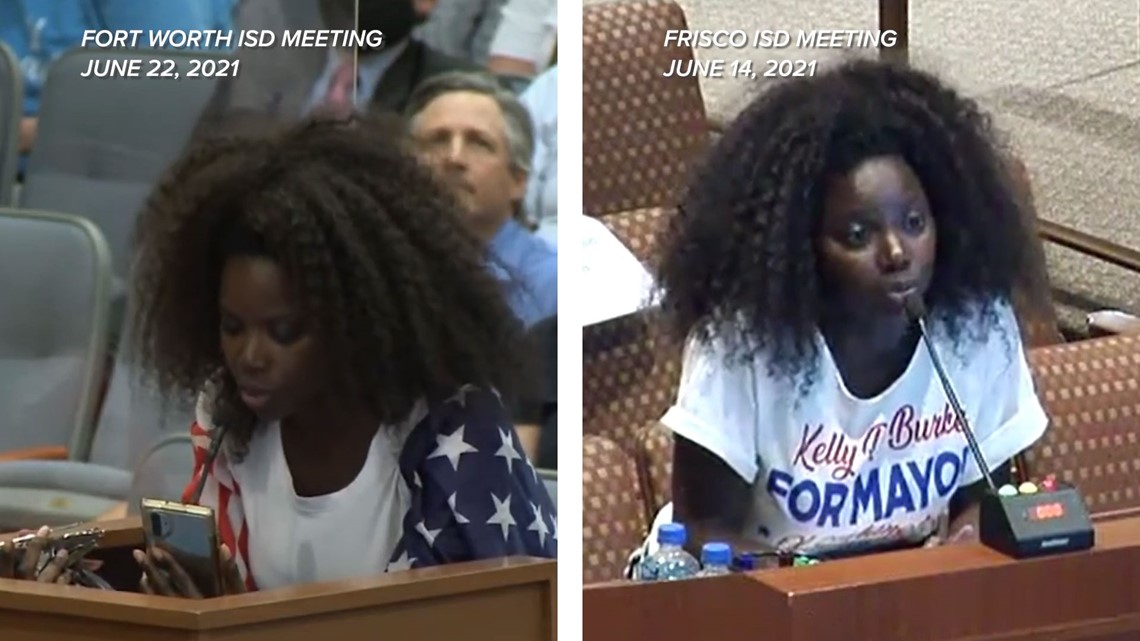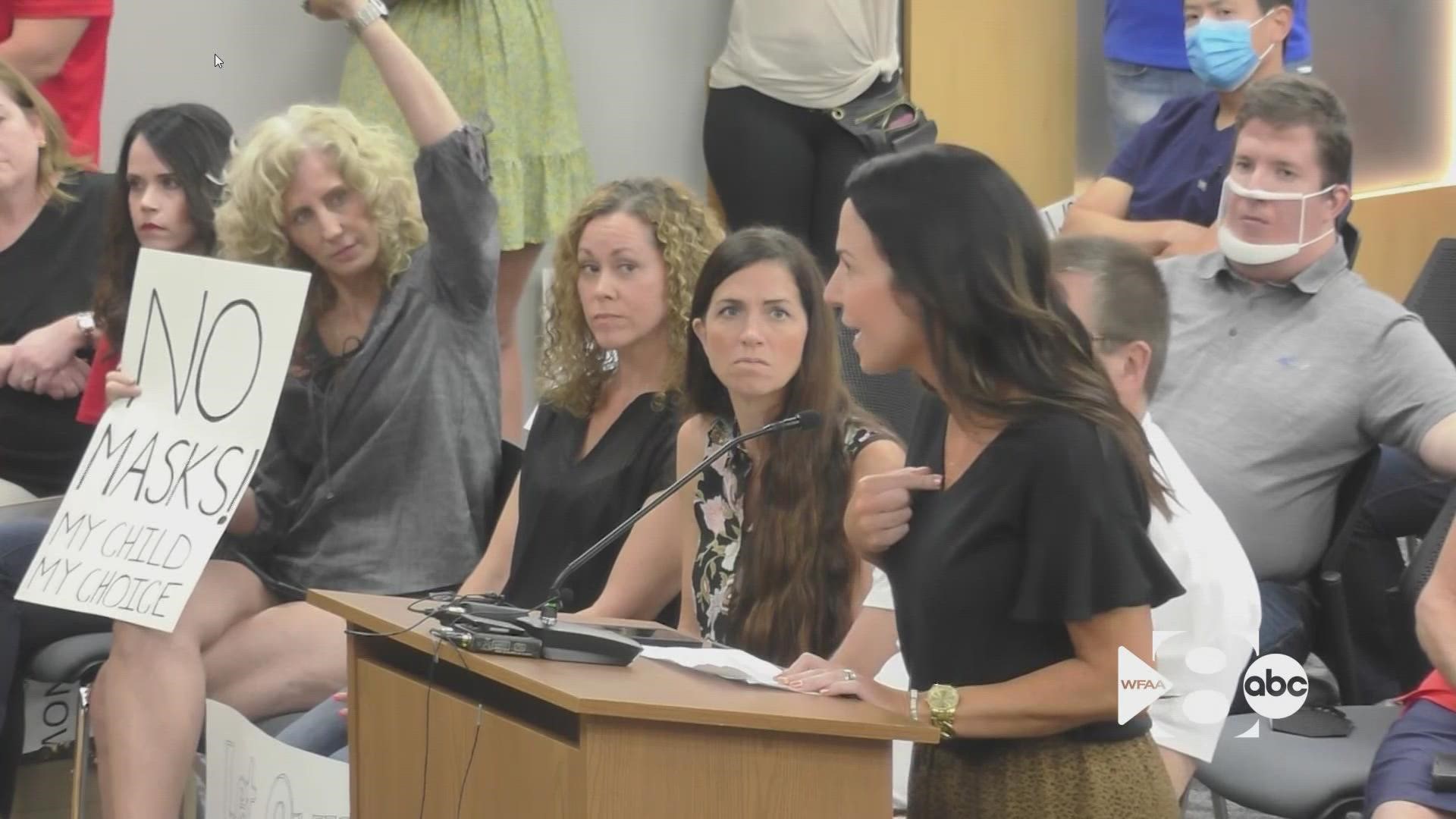DALLAS — It seems like nearly every week there’s another one.
Another clip of a shouting match or rant from a school board meeting goes viral -- whether it’s from Texas or Tennessee, Oklahoma or Oregon.
"Who are you to tell me what I can and cannot do?!” a parent shouted at one recent Plano ISD meeting, arguing against masks.
"Quit throwing it down my throat and everybody else's!” a Frisco ISD parent recently yelled to the board of trustees in their city, accusing the district of teaching critical race theory. “I am very pissed."
"Monsters! You're all monsters!" another parent recently shouted at the Dallas ISD board.
School board meetings used to be boring. They used to be sparsely attended affairs where the discussions centered around buying new software or installing water fountains. The most heated debates were over new bonds.
Robert Seward knows that. He’s been a member of Mesquite ISD’s board for nearly 30 years, and he’s the former president of the Texas Association of School Boards (TASB).
"I tell you right now, our kids are watching what's going on,” Seward says. "It's almost like a bully sometimes in a schoolyard. He didn't get his way; he wants to just holler and scream and then finally use the fists. Well, that doesn't get you anywhere."
Exactly when the increase in hostility started can be debated, but Seward says 2017 is when he first noticed the temperature increase. Things then boiled over when COVID arrived in 2020.
"What you're seeing is that intensity increase more than I've ever seen it increase,” he says.
At Texas Christian University in Fort Worth, Dr. Erin Atwood researches and teaches about education leadership working with future educators.
"It's not just happening in a few isolated pockets -- this is happening across the country,” she says. “It's been attacks, verbal attacks, threats of physical violence towards school board members rather than talking about the issues that are of concern to parents, community members, educators and so forth.”


Phil Gore talks to board members across the state daily. He works at TASB to train and develop board members.
"Some members of the public will look to the school board as the customer complaint department -- that doesn't work,” he says. “School board meetings are not a public meeting. They are a meeting of the school board conducted in public.”
Gore says the tension he’s seen has been mostly in suburbs, and both he and Atwood believe the fact that hostile meetings are a nationwide problem is evidence that the issue isn't local policies at all. It's national politics.
"All of this kind of generated the parent interest to come out and say, 'Wait a minute, this district belongs to me,'" says Jonathan Butcher, a fellow at the Heritage Foundation, a national conservative think tank. "'I'm a resident here. I pay taxes here and here is how I want my values to be displayed.'"
Butcher has served on several school boards himself. The Heritage Foundation, where he currently works, is one of many groups providing parents with resources on how to be involved in board meetings. The group has already repeatedly organized and pushed the anti-critical race theory (CRT) movement across the country.
"It is a moment where people are upset about what's happening in schools, but it's also a great opportunity," Butcher says. "It's a great opportunity for us to hear what parents have to say."
It’s not always parents within the district that have something to say, though.


WFAA watched through hours of board meetings and discovered Blanca Martinez and Ajua Mason both spoke at a Fort Worth ISD board meeting in June.
"CRT is a poison," Martinez said at the meeting. "It's a poison to the mind."
Both were also present at a Frisco ISD meeting a week earlier, where Martinez shared anti-vaccine misinformation. Then, in September, Mason used a different name but spoke at an Arlington ISD meeting sharing anti-mask misinformation.
"[Parents] are looking for ways to, hopefully, peacefully and appropriately make their opinions known to a school board," Butcher said.
The aggressive meetings didn’t start with masks or COVID-19. It was CRT that first led parents to fill up board rooms.
"You hear some of the same language and phrasing being used," Atwood says. "There's this way that communities are being coached to respond."
Atwood and Seward both say CRT, a university-level legal subject that studies racism as a social construct impacting housing, education and justice, is not taught in K-12 schools. That didn't stop Texas Republican lawmakers from passing bill this year that they say bans CRT from being taught.
"We've never taught it in Texas,” Seward says. "It's politics, people trying to take a catch phrase and make it something that it's not."
"The rational response from the other side is, 'Well, we're not teaching CRT,'" Atwood says. "[But] that's a very simple message that doesn't, y'know, catch fire. So it's how do you sort of build coalition around the other side?"
Coalitions of parents are questioning everything from library books to classroom lessons, and school boards are becoming increasing political. Lawmakers are now joining, and even encouraging, the fight.
In November, Gov. Greg Abbott told the Texas Education Agency to find and remove any "pornographic materials" in school libraries, but the TEA doesn’t have any licensed law enforcement officers to do that work.
Republican state lawmaker and Tarrant County District Attorney candidate Matt Krause also publicly asked districts if they had any of a list of 850 books that discuss, race, gender and LGBTQ issues in their libraries.
This is just the tip of the iceberg. In December, the Texas Republican Party announced it would create a local government committee and specifically target non-partisan races, mentioning recent Carroll ISD board races as a path to success.
“It's not just math and reading, right?" Butcher says. "We're talking about how history should be taught. We're talking about what should be contained in social studies."
The conservative Southlake Families PAC has raised hundreds of thousands of dollars to its cause, and candidates it has backed have overwhelmingly won the last three Carroll ISD seats. The PAC's mission, according to its website, is to "protect our traditional way of life, which is currently under attack by extremists."
Southlake residents have strongly supported that mission not just in elections but -- where else? -- in school board meetings, too.
"We will work each seat on this board until each one holds a strong conservative,” a parent said at a recent public meeting.


"When I hear the word 'values' -- to me, that's code word for partisanship," TASB's Gore says. “When I hear someone say, y'know, 'Local elections, we need to know what party they're with so we know what their values are.' No, that's what divides us. That's not what unites us. School boards need to be comprised of individuals that value students, value their community and value that collective moving forward, not a partisan agenda moving forward.”
The first national school board PAC, the 1776 Project, has claimed that 75 percent of the conservative candidates it backed won their November elections.
"They're trying to pull our kiddos and our school districts into something that we shouldn't be pulled into," Seward says. "These kids are not titled Republican, Independent or Democrat. They are kids."
"Money will come with an obligation, and I think that's a very important concern that we should have for the future of Texas school boards," Gore says. "There should absolutely be limits on the amount of money that can be given to a race or spent on a race."
For his part, the Heritage Foundation's Butcher believes politics have always been part of school boards.
"I think progressives have been doing so for years," he says. "Teacher unions have been very influential in school board races for decades prior to now."
The temperature between politics and school boards, though, has changed.
"Some of the anger is spilling out beyond the meetings, and I think that's worrisome," Atwood says.
Conservative group Turning Point USA has an online school board watch list that it says helps expose "radical and false ideologies endorsed by school boards." Emails to Turning Point USA about its watch list were not returned.
"Certainly, some people have feared for their own safety," Gore said.
In El Paso, a board member had a window at their home broken after a vote on mask requirements.
"School board members have to show that their constituents are heard," Butcher says. "They have to show that they have heard the comments that parents are making, those that elected them and put them in those seats."
"Just because the school board doesn't act in the way you want them to act doesn't mean that you haven't been heard," Atwood says.
"Educators are caught in the middle of all of this -- the pandemic, the politics, everything,” Seward says.
Gore is now worried that the TASB is getting more concerned comments from board members across the state about the tensions and increasing political battles.
"That's something I probably hear on an average of once a week: 'This is not what I signed up for,'" Gore says. "They didn't sign up to be yelled at, screamed at."
There's a falling out to come from that. Across North Texas, since November alone, nearly a dozen superintendents have either resigned, left their posts or publicly announced their intentions to soon do so -- including those in both Dallas ISD and Fort Worth ISD.


"I think the folks that are sort of instigating these conversations right now see that as a win," Atwood says.
All board positions are unpaid, it's important to remember. And districts are still struggling to fill positions with many teachers getting out of education over COVID and political concerns. A recent Texas AFT poll found 66 percent of educators in Texas recently considered quitting their jobs.
"It's in all of our best interests and the best interest of school kids to have conversations with one another rather than just attack one another,” Atwood says.
"I think what's getting lost is the ability to think about what we're here for," Seward said. "We're here for providing education for all of our students, including their health, safety and wellbeing."
"We all care about kids," Gore said. "We all want them to be successful and have a good future. So, now let's focus on that. How do we do that together?"

